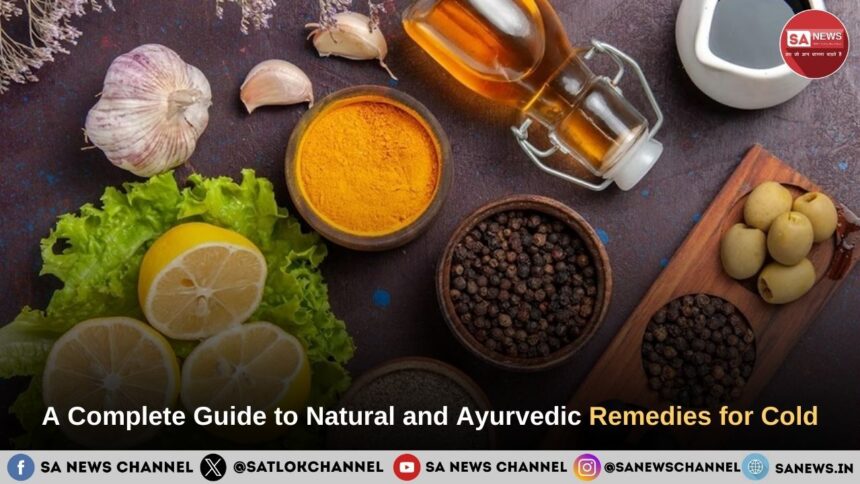With the arrival of monsoons, catching a cold almost feels inevitable. However, even sudden weather changes can bring it on just as quickly. This comprehensive guide explores the most effective natural remedies for cold, including Ayurvedic home remedies for cough and cold, herbal teas, steam inhalation and immunity-boosting foods. These time-tested treatments not only provide fast relief from congestion, sore throat and fatigue but can also strengthen your immune system, making you more resilient against seasonal infections.
- Understanding the Common Cold
- Why Natural Remedies?
- Popular Natural Remedies for Cold
- Ayurvedic Remedies for Cold
- Tulsi (Holy Basil) for Cold Relief
- Turmeric Milk (Haldi Doodh) for Cough and Cold
- Ginger (Adrak) for Cold and Flu
- Ayurvedic Kadha (Herbal Decoction)
- Trikatu (Three-Spice Blend)
- Steam Inhalation with Ajwain or Eucalyptus Oil
- Bhimseni Kapoor (Camphor)
- Diet and Lifestyle for Cold in Ayurveda
- Safety Note on Ayurvedic Remedies for Cold
- Lifestyle Practices that Support Recovery
- Why the Common Cold Still Has No Cure
- The Root Cause of Diseases That Science Can Never Cure
- FAQs
Understanding the Common Cold
The common cold is a viral infection primarily caused by rhinoviruses, though other viruses such as coronavirus (non-COVID strains), adenovirus and respiratory syncytial virus (RSV) can also trigger it. It spreads through respiratory droplets, direct contact or contaminated surfaces.
Symptoms generally appear one to three days after exposure and include sneezing, runny or stuffy nose, sore throat, coughing, mild body aches, low-grade fever and fatigue.
While there is no cure for the cold, natural remedies can help ease symptoms and may even shorten the duration of illness.
Why Natural Remedies?
Natural remedies for cold are appealing for several reasons. They are typically more affordable, widely available and often come with fewer side effects compared to pharmaceutical treatments. Most importantly, the majority of the home remedies are easily available to us at home.

Many remedies focus on strengthening our immune systems, addressing not only the symptoms but also the root causes, such as weakened immunity or exposure to environmental stressors. Furthermore, natural remedies are often gentle and suitable for repeated use, for children and also for those seeking to avoid medication overuse.
Popular Natural Remedies for Cold
Natural remedies for cold are as diverse as the cultures and geographies they come from, with each region offering its own time-tested healing secrets passed down through generations. However, we will list down those natural remedies that are preferred by most cultures and are easily available.
Honey
For generations, people have relied on honey for cold and cough relief, recognising it as one of the most effective natural remedies for soothing sore throats and easing irritation. It has antimicrobial properties and acts as a soothing agent for irritated mucous membranes. Combining honey with warm water, herbal tea, or a splash of lemon is a simple home remedy that helps ease sore throat discomfort and naturally calm coughing. Though it is vital to understand that lemon may not suit all. It has sometimes led to worsening of throat infections in those who cannot tolerate it.
Raw and organic honey is also considered the most beneficial, however, it should not be given to children under one year of age due to the risk of infant botulism. In India, a throat-soothing concoction has also been mixing honey and turmeric in equal amounts and consuming this paste.
Ginger
Ginger is a powerful anti-inflammatory root that helps reduce throat inflammation, suppress coughing and alleviate congestion. Consuming ginger tea made from fresh slices steeped in hot water is a popular home remedy. Ginger can also be combined with honey for a cold-fighting drink.
Traditionally in India, ginger is added to milk based tea, also known as adrak wali chai, and has long been consumed as a popular form of tea, especially in monsoon.
Garlic
Known for centuries as a healing food, garlic supports the body by fighting off germs and improving immune resilience.. It contains allicin, a compound believed to reduce the severity and frequency of cold. Adding raw or lightly cooked garlic to meals or consuming garlic supplements may help support the body’s natural defences.
Echinacea
Echinacea is a popular herbal remedy that may reduce the duration and severity of cold symptoms if taken at the first sign of illness. It is available in teas, capsules and tinctures. While evidence is mixed about its effectiveness, many people report benefits from its immune-stimulating effects.
Also, some people prefer consuming echinacea during seasonal changes and fluctuations.
Vitamin C
Vitamin C is one of the most well-known natural remedies for cold. It supports the immune system and may reduce the duration of symptoms. Fruits like oranges, kiwis, strawberries, along with vegetables such as bell peppers, serve as rich dietary sources of essential vitamins, such as vitamin C, and antioxidants. Vitamin C supplements are also widely available.
Additionally, in India, we also have access to amla or Indian gooseberry, guava and raw mango (kachi kairi). All of these are rich sources of vitamin C.
Zinc
Zinc is a vital nutrient that plays an important role in immune health, with studies suggesting that adequate zinc intake may help the body recover faster from cold and other infections. Research suggests that zinc lozenges may reduce the length of a cold if taken within 24 hours of symptom onset. However, excessive zinc intake can cause side effects, so moderation is important.
Steam Inhalation
Inhaling steam is an easy yet effective way to ease blocked nasal passages and reduce sinus discomfort. Inhaling steam from a bowl of hot water or taking a hot shower helps loosen mucus and makes breathing easier. Adding essential oils like eucalyptus oil for cold relief or peppermint oil for congestion to steam inhalation can amplify its effectiveness, helping to clear nasal passages and ease breathing naturally.
Today, for the ease of convenience, capsules have been formulated that hold a calculated mixture of essential oils in a certain carrier. Such capsules can be cut and its contents can be added to hot water for steam inhalation. An example of such a formulation is Karvol plus capsule available in India.
Saltwater Gargle
Gargling with warm salt water for sore throat relief is one of the simplest and most effective natural remedies, helping to reduce irritation, loosen mucus, and ease discomfort. It helps reduce swelling, loosen mucus, and flush out irritants or bacteria. Dissolving half a teaspoon of salt in a glass of warm water and gargling several times a day can provide relief.
Also Read: Medical Science and Its Wonders Transforming Health, Healing, and Human Life
Hydration
Staying hydrated is essential during a cold. Fluids help thin mucus, keep the throat moist and prevent dehydration caused by fever or reduced appetite. Water, herbal teas, clear vegetarian broths and diluted fruit juices are excellent choices.
Rest and Sleep
Adequate rest is often overlooked, however, it remains one of the most important natural ways to support recovery from a cold. Getting enough sleep during a cold is essential, as it helps the body repair itself, speeds up recovery, and strengthens immune defences to fight infections more effectively. Skipping rest may prolong symptoms and delay recovery.
Ayurvedic Remedies for Cold
Ayurveda, the ancient Indian system of natural healing, offers a wide range of Ayurvedic remedies for cold and cough that focus on strengthening the immune system, balancing the body and easing discomfort. People find these Ayurvedic home remedies for cold both soothing and effective.
Tulsi (Holy Basil) for Cold Relief
Tulsi, often called the ‘Queen of Herbs’, is widely used in Ayurvedic treatment for cold and cough. Its antiviral and antibacterial properties make it a natural immune booster. Drinking tulsi tea for cold or chewing fresh tulsi leaves can help relieve congestion, sore throat and cough.
Turmeric Milk (Haldi Doodh) for Cough and Cold
In India, turmeric milk, also called haldi doodh or golden milk, has been relied upon for generations as a trusted Ayurvedic remedy for colds. Turmeric contains curcumin, a powerful anti-inflammatory compound that helps reduce throat irritation and supports recovery. A warm drink made with turmeric, milk and a pinch of black pepper before bedtime is a traditional home remedy often used to ease colds and soothe sore throats.
Ginger (Adrak) for Cold and Flu
Fresh ginger is considered one of the best Ayurvedic medicines for cold. Its warming nature helps clear mucus and improves circulation. A simple ginger tea for cold and cough, made with fresh ginger slices and honey, just as discussed in the section preceding this, is soothing for sore throats and nasal congestion.
Ayurvedic Kadha (Herbal Decoction)
Ayurvedic kadha for cold is a concentrated herbal drink made by simmering tulsi, black pepper, cinnamon, ginger and cloves. This powerful concoction helps boost immunity, clear phlegm and reduce symptoms of cough and congestion. Kadha is widely relied upon in many households as a natural remedy for colds and flu.
Trikatu (Three-Spice Blend)
Trikatu is a traditional Ayurvedic blend made from black pepper, long pepper or pippali and dried ginger, valued for its therapeutic benefits. Traditionally used as an Ayurvedic cure for cold, it helps clear blocked sinuses, enhance digestion, and strengthen the respiratory system. It also helps in clearing congestion in the respiratory passages. It’s available in powders, tablets and syrup, however, should ideally be taken with professional advice.
Steam Inhalation with Ajwain or Eucalyptus Oil
Ayurveda often recommends steam inhalation for cold by adding ajwain (carom seeds) or a few drops of eucalyptus oil to boiling water. This may help open nasal passages, reduce congestion, and make breathing easier. Always use caution to avoid burns and keep young children away from direct steam.
Bhimseni Kapoor (Camphor)
Bhimseni Kapoor is a variety of camphor that helps in healing cold. It can be added to hot water to inhale the steaks. Primarily aiding clearing of nasal passages and respiratory tracts, it can also be used as a chest-rub when mixed with a carrier oil.
Diet and Lifestyle for Cold in Ayurveda
A balanced diet is key to recovery in Ayurvedic practice. During a cold, Ayurveda emphasises steering clear of greasy meals, dense foods and anything taken directly from the fridge, as these can aggravate the condition. Instead, favour light, warm meals like vegetable soups, khichdi and Ayurvedic teas for cold with spices such as cumin, coriander, cardamom and black pepper. Such foods do not overload the digestive system, helping the body to focus more on recovery than being burdened with digesting heavy foods.
Staying warm, resting, and drinking plenty of warm liquids are all part of the holistic healing process.
Safety Note on Ayurvedic Remedies for Cold
Ayurveda provides time-tested approaches for managing cold and cough, which can be remarkably effective when followed properly. Food-based remedies like ginger, tulsi and turmeric are generally safe, but concentrated formulations and supplements should be taken under the guidance of a qualified Ayurvedic practitioner, especially if you are pregnant, breastfeeding or managing chronic conditions.
The popular trend of popping turmeric and ginger shots or capsules are not the ideal methods of consuming these two potent herbs. Especially turmeric, since it’s most effective when paired with a source of fat. That is why, traditionally, haldi doodh has been consumed as it pairs turmeric with the fats from milk, helping in maximum absorption of turmeric.
Lifestyle Practices that Support Recovery
Beyond specific remedies, simple lifestyle practices can greatly support the body’s recovery from a cold. These include:
- Using a humidifier to keep indoor air moist to soothe irritated nasal passages.
- Avoiding smoking and exposure to second-hand smoke. Smoking can aggravate symptoms.
Why the Common Cold Still Has No Cure
Although a common cold may not rank among the most dangerous illnesses of our time, anyone who has endured persistent congestion, sore throat and fatigue knows just how disruptive it can be. A seemingly small infection can leave a person drained, irritable and unable to function at their best.
Across different systems of medicine, colds are often linked to a weakened immune response. A virus takes advantage of this lowered defence by attacking the body. But this raises deeper questions. Why should such a microscopic entity overpower human strength? Why does illness arise in the first place? And if modern science has advanced so remarkably, why has it still not found a permanent cure for something as ordinary as the ‘common’ cold?
The truth runs deeper than the surface explanation of ‘a virus attack’. Viruses are only the outer expression, not the root cause. This is precisely why science has not been able to provide a definitive cure.
Jagatguru Tatvdarshi Sant Rampal Ji Maharaj, clarifies that the true origin of all sickness lies in the unseen karmic account carried by each soul. While this perspective may feel unusual and out-of-context at first, it sheds light on why suffering persists despite medical progress. Take a look beyond symptoms and science, and to recognise the spiritual dimension that underlies human health and disease in this world.
The Root Cause of Diseases That Science Can Never Cure
Sant Rampal Ji Maharaj explains that every relationship and interaction in life stems from karmic ties, where one plays the role of giver and the other of receiver. What is exchanged, whether joy, sorrow, or even illness, actually emerges from the account of past deeds.
The ultimate cause of diseases lies not in microbes or medical charts, but in our own karmas. Scientific explanations are confined to describing cells, immune responses or the mechanics of viral entry into the body. At best, science tells us ‘how’ we contract an illness, but it does not reveal ‘why’ we fall ill in the first place.
Sant Rampal Ji Maharaj uncovers the deeper truth of this karmic system of give-and-take, instituted by Satan (Kaal Brahm), the ruler of the twenty-one mortal universes, including our Earth. Even the deities were not exempt. Take the case of Lord Vishnu – his act of misleading King Bali in Dwaparyug brought inevitable consequences upon him in a later age. When he incarnated as Ramchandra in Tretayug, he was killed by a hunter (the rebirth of King Bali) thus paying the debt of his own karma.
In the same way, a virus does not invade without reason. Every such attack carries a karmic connection, a settlement of accounts for harm once inflicted upon another living being. The illness we experience is, therefore, not random, but a precise balancing of karmic dues.
Can science erase this root cause? Never. Medicines may ease symptoms, but they cannot break the chains of karma. Only the true worship granted by a Complete Saint (Tatvdarshi Sant) has the power to dissolve these karmic bonds. Among spiritual leaders of the present age, Sant Rampal Ji Maharaj is the only Tatvdarshi Sant. The spiritual practice He imparts has liberated countless devotees from ailments which were once deemed incurable, including life-threatening diseases like cancer.
Given below is a striking testimony from a disciple whose chronic cough and debilitating migraines vanished after adopting the authentic method of worship given by Sant Rampal Ji Maharaj. This is proof that true healing begins at the spiritual root:
To learn in depth about the dynamics of our karmic account, consequences and the way to break free of this insidious karmic cycle within Kaal Brahm’s territory, listen to eye-opening spiritual revelations by Sant Rampal Ji Maharaj. Visit:
Website: www.jagatgururampalji.org
YouTube: Sant Rampal Ji Maharaj
Facebook: Spiritual Leader Saint Rampal Ji
‘X’ handle: @SaintRampalJiM
FAQs
Q1: What is a natural way to cure cold fast?
Answer: While there is no cure for cure, some natural remedies like inhaling steam, consuming warm liquids, etc. can help recovery.
Q2: How to stop a cold in 24 hours?
Answer: Cold cannot be cured in 24 hours as there is, unfortunately, no cure for cold. The recovery period for cold is more than 24 hours.







